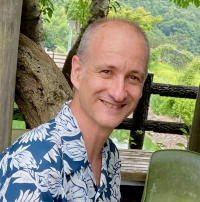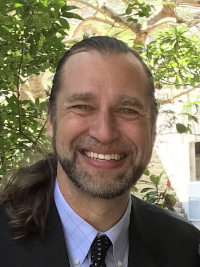e塾とは?
e-Juku is an online skill-building program, in which students translate the same short text, refine it based on input from checkers who are native speakers of the source language, and receive feedback from veteran translators who are native speakers of the target language. This all takes place via a web-based forum and e-mails over one or two months
If you wish to participate in the next session, please send an email to e-Juku Committee.
Testimonials:
You can’t get opportunities like this anywhere else... it is enormously valuable for newbies.
It's been a remarkable experience for me.
eJuku has been a truly eye-opening and educational experience for me, and I also enjoyed it very much.
I joined JAT without knowing that such learning opportunities existed, and it made me very glad that I did join.
Coordinator and Mentor:

Richard Sadowsky
Mentor:

David Ulvog
NJS Checker
Shu Yamakawa
An Overview of JAT’s eJuku Program
1. History
JAT (Japan Association of Translators) is committed to catering to
the needs of its membership. One of the most frequent requests is for
JAT to offer translator training programs. In addition to the regular
monthly meetings and IJET (International Japanese-English Translation)
and other conferences, which offer a variety of training opportunities
for practicing translators, JAT launched a program in 2009 specifically
designed to give novice translators hands-on introductory training in
the art of translation. JAT officers who worked on this program in its
initial years, including Fred Uleman, Helen Iwata and Jeremy Whipple,
gave it the moniker 'eJuku'.
As of this writing, a total of 15 sessions have been held with 110
participants, as shown below. Nos. 2 and 7 were E-to-J sessions. Nos. 5
and 12 had two back-to-back sessions.
===============================
Past eJuku sessions at a glance
===============================
( ) indicates the number of participants
No.1 J>E 1 October 2009 (3)
No.2 E>J 1 January 2010 (3)
No.3 J>E 2 February 2010 (3)
No.4 J>E 3 November 2011 (3)
No.5 J>E 4 April 2012 (5)(4)
No.6 J>E 5 October 2012 (8)
No.7 E>J 2 August 2013 (5)
No.8 J>E 6 September 2013 (5)
No.9 J>E 7 September 2014 (8)
No.10 J>E 8 March 2015 (7)
No.11 J>E 9 February 2016 (7)
No.12 J>E 10 April 2017 (8)(9)
No.13 J>E 11 March 2018 (8)
No.14 J>E 12 March 2019 (6)
No.15 J>E 13 April 2020 (9)
No.16 J>E 14 April 2021 (9)
The current eJuku mentoring team is composed of four veteran
wordsmiths: Danny MacLeith, David Ulvog, Richard Sadowsky, and Shu
Yamakawa. (Jeremy Angel--in the video above--stepped down after the 2021
session. Thanks for your brilliant service, Jeremy!).
2. Format
When it was first started, eJuku was strictly a document-based
training workshop. The participants translated the source text into
English and emailed their work to the checker for review in terms of
source text comprehension. The students then submitted their revised
drafts to the mentors for their comments from the viewpoint of
translation. Based on the mentors' feedback, they could choose to
finalize their translation. Questions and answers between the mentors
and participants were limited in volume and depth.
The next team followed basically the same approach when it first took
over from the program's predecessors in 2011. The session went very
well, but the team nevertheless felt a keen need for greater interaction
between the participants and mentors, as well as among the participants
themselves. The format underwent some changes:
- The participants are given the opportunity to learn what translation
is all about in a heuristic manner through peer-to-peer discussion with
occasional help coming from the mentors.
- To ensure private, open-minded, and candid exchanges of opinion, a
closed discussion forum was provisioned in JAT's Basecamp communication
system.
- For enhancing the interpersonal aspect of the program, videoconferences were held and expanded in number. (Today we use Zoom.)
--------------------------------------------------------------------
Spring 2022 schedule (tentative)
Start of April: eJuku publicly announced; Call for Participants sent to inquirers
Call closed within 7 to 10 days
Applicants screened; participants selected and notified
Forum set up on Basecamp, session begins
Around the third week of April: Initial translation deadline
April 23, Saturday 10:00 a.m. JST: 1st videoconference & forum discussion
April 30, Saturday 10:00 a.m. JST: 2nd videoconference & forum discussion
May 7, Saturday 10:00 a.m. JST: 3rd videoconference & forum discussion
May 14, Saturday 10:00 a.m. JST: 4th videoconference & additional discussion
Questionnaire distributed and responded to
May 21, Saturday: Forum closed; turned read-only before closing
--------------------------------------------------------------------
At the start of the discussion period, one of the mentors creates and
uploads an Excel file dividing the source text into sentences or other
sensible sections, with the participants’ translations for each section
listed below, so that participants have access to each other’s attempts
(and most recently, the mentors' versions, as well) from the first day
of discussion. During the forum discussion period, the team members —
the three mentors plus the checker — access the forum regularly but try
to allow the participants to discuss their translations amongst
themselves. They will also join in to share their thoughts in the
message board discussion, as deemed appropriate, making necessary
comments to assure lively discussions among the participants. The
participants not only learn from each other, but soon see the solutions
provided by the more experienced translators. This methodology allows
participants to analyze everything and develop the skill to translate on
their own, rather than simply to be handed answers.
The source text used in a typical J>E session is a general,
non-technical passage (usually about 400-600 characters in length)
chosen by one of the mentors from real-world situations. The 2022
session will feature multiple passages to submit week by week, offering a
chance for participants to apply what they learn as they go along.
During the entire period of an eJuku session, the participants can ask
the mentors any career-related questions, as well as any general
translation questions which are not directly related to the source text.
The real-time video conferences seem to be an ideal venue for this kind
of conversation. (The videoconferences are recorded for those unable to
participate.)
As a matter of principle, eJuku is free, with participants contributing
nothing but their time and enthusiasm. The only other requirement is
that they join JAT if they are not already members. Team members, too,
receive no monetary compensation for the time they spend on eJuku
activities, but the rewards of participation are great enough to keep
them going. They are committed to, and enjoy, helping people to learn
and develop their skills and careers.
3. Outcome
Toward the end of each session, the coordinator distributes a
questionnaire to get feedback from the participants. On a scale of 1 to
7, with 7 being the best, the session regularly receives 6s and 7s. The JAT website page on eJuku
includes a few of these favorable testimonials. Although the organizers
are always looking for ways to improve eJuku, participants often agree
that it was an excellent learning experience.
It takes a long time for a novice translator to become a seasoned
practitioner. No attempts have yet been made to follow up on the
movements of the former participants. Interestingly, however, some
former participants have become very active JAT members serving on
various committees.
4. Rollout
eJuku embodies an altruistic spirit—the belief in the value of learning, the joy of teaching and learning from each other, and growing together—and this philosophy can certainly be applicable in other environments as well. There are now special interest groups such as JATPHARMA and JATLAW that hold their own meetings and workshops.
5. Next eJuku session
The Spring 2021 eJuku session was completed in early June. The next
session is taking place in April and May 2022. An announcement is posted
on the JAT Website when the details are set. The application window may
be quite short, so keep checking the JAT Website for news and other
information if you are interested in participating in an upcoming eJuku.
Eligibility requirements for participation in the J-to-E eJuku session are:
1. JAT membership (non-members are required to join JAT if selected to participate)
2. Native or near-native English proficiency (eJuku requires already superb English)
3. Ideally no more than a couple of years' experience as a professional translator
4. High motivation to learn and a commitment to participate actively in the videoconferences and written discussions